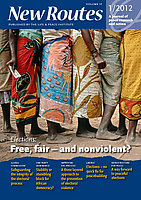
#1 2012 Free, fair – and nonviolent?
Elections: Free, fair – and nonviolent?
Free and fair elections are in many aspects seen as the basis for democracy and are mentioned in Article 21 of the United Nations Declaration of Human Rights: “The will of the people shall be the basis of the authority of government; this will shall be expressed in periodic and genuine elections which shall be by universal and equal suffrage …” However, not least in politically unstable or postconflict situations, tensions between contending parties may lead to outbursts of violence. Therefore, maybe “nonviolent” should be added to the often used phrase “free and fair elections”?
Still, a word of warning against an exaggerated trust in free elections would be in place. They are no panacea for the problems encountered in peacebuilding and development. With examples from Liberia, Morten Bøås in his article reflects on elections in a country where the war is over but peace has not yet come. This situation becomes especially volatile in multi-ethnic societies, where the outcome of the elections may result in increased marginalisation of one or more groups.
Examples of election-related violence and efforts to mitigate it are found in several of the articles in this New Routes issue. Paul van Tongeren and Jacob Brand-Jacobsen present the setting up of Infrastructures for Peace, which have improved the situation in a number of vulnerable environments.
Andrew Bradley and Sead Alihodzic, both from the International Institute for Democracy and Electoral Assistance, in their respective articles stress the need for actors at different levels to safeguard the integrity of the electoral process.
While multi-party democracy is winning ground in large parts of the world, some countries on the African continent emerge as, or remain, democracies with one-party dominant systems. Renske Doorenspleet and Lia Nijzink analyse the causes and consequences of this type of political system.
It is an interesting mental exercise to think of all the experiences of voting and elections among New Routes readers. Do you regard your right to vote as a privilege or a duty, or maybe as a combination of both? Do you take universal and equal suffrage for granted or does it have the excitement of a new phenomenon in your community? Would you agree that it is your responsibility as a citizen to express your opinion in free, fair – and nonviolent – elections?
Global commission on elections, democracy and security:
Safeguarding the integrity of the electoral process
Andrew Bradley
One-party dominance:
Stability or stumbling block for African democracy?
Renske Doorenspleet & Lia Nijzink
Iproving the process:
A three layered approach to the prevention of electoral violence
Sead Alihodzic
Liberia:
Elections – No quick fix for peacebuilding
Morten Bøås
Infrastructure for peace:
A way forward to peaceful elections
Paul van Tongeren & Kai Brand-Jacobsen
Läs New Routes #1 2012
Publicerad: 2013-05-07
Köp New Routes
Läs mer om New Routes i katalogen
Fler artiklar knutna till New Routes
Fler tidskrifter i kategori SAMHÄLLE, MILJÖ & POLITIK
Fler tidskrifter i kategori GLOBALT
